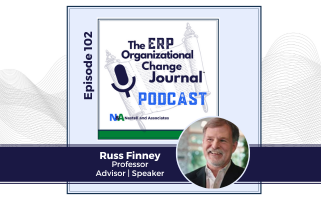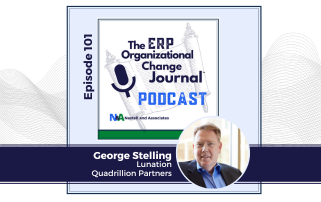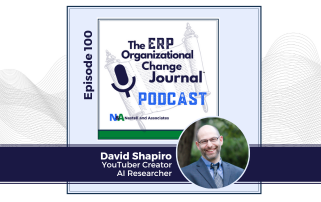In this Episode…
We discuss successful and sustainable organizational change with Paul Gibbons. Research suggests that successful and sustainable ERP change requires that executive leadership understands, evaluates, reflects upon, and improves their ability to lead ERP organizational change. Paul will share insight from his book, “The Science of Successful Organizational Change” which offers a “blueprint for change” that fully reflects the newest advances in mindfulness, behavioral economics, sociology, and complexity theory.
In his book, and website, Paul shares that “Change will never be easy. To systematically improve your odds, you need science, a framework built on science, and actionable lessons from leaders who’ve made change work.” Sustainable ERP organizational change continues to be a common and significant corporate project, the challenges can be significant. However, a sustainable organizational change program founded in science-based principles and applied research provides the organization with increased opportunities for ERP organizational change success. There are many in academia and practice dedicated to the pursuit of research and applied research to provide further theoretical and practical insight into the field of ERP organizational change success. ERP organizational change research is and should be, a diversified and multi-disciplinary and inter-disciplinary endeavor. As organizations and ERP practitioners, we benefit from learning from the work of other fields and disciplines. Moreover, the “human element” and culture component of sustainable ERP organizational change can not be understated.
There are multiple levels of stakeholders in an ERP organizational change effort that are diverse in many ways. As a behavioral scientist, culture, and leadership expert, in this episode we tap into Paul’s insight and learn more on this topic!
Paul Gibbons
More About Paul
Paul previously advised PricewaterhouseCoopers (PwC), KPMG, and Deloitte on talent, culture, and leadership.
From 2010-2020, he was on the keynote circuit across five continents, speaking on the future of business: Humanizing business, leading change, culture change, ethics, and the future of work. During that decade, he was also an adjunct professor of business ethics and leadership at several U.S. business schools.
He previously authored five books, most prominently The Science of Organizational Change and Impact, the first two books in the Leading Change in the Digital Age series. Those books birthed the conversation about change mythology. The first volume of his Humanizing Business series, The Spirituality of Work and Leadership, was published in 2019.
After “experimental careers” in computer science, derivatives trading, economics, and neuroscience, Paul spent eight years as a consultant at PwC before founding Future Considerations. That firm became Europe’s top leadership consulting firm working with Shell, BP, PwC, KPMG, Barclays, and HSBC, on leadership, strategy, and culture change.
Paul is a fellow of the Royal Society of Arts, a hyperpolyglot, ranked a “top-20 culture guru” and CEO “super coach” by CEO Magazine. In 2000, he was elected to the U.S. Academy of Management Council, and he is a member of the American Philosophical Association, the American Association for the Advancement of Science, and the Institute for Business Ethics.
Connect
Episode Mentions
- Book: The Science of Organizational Change: How Leaders Set Strategy, Change Behavior, and Create an Agile Culture (Leading Change in the Digital Age)
- Elisabeth Kübler-Ross,https://en.wikipedia.org/wiki/Elisabeth_K%C3%BCbler-Ross
- John Kotter, https://en.wikipedia.org/wiki/John_Kotter
- Lewin, K. (1947). Change management model. New York, NY: MacGrawHil.
- Lilienfeld, S. O., Lynn, S. J., Ruscio, J., & Beyerstein, B. L. (2011). 50 great myths of popular psychology: Shattering widespread misconceptions about human behavior. John Wiley & Sons. https://www.amazon.com/Great-Myths-Popular-Psychology-Misconceptions/dp/1405131128/ref=sr_1_1?crid=VLVJ170CSCAU&keywords=Scott+Leefield%2C+%E2%80%9CThe+50+myths+of+popular+phscology+%E2%80%9C%2C&qid=1673882925&sprefix=scott+leefield%2C+the+50+myths+of+popular+phscology+%2C+%2Caps%2C97&sr=8-1
- Paul Gibbons (2023), “Change Myths” (book coming soon), but here are some others https://paulgibbons.net
Episode Highlights Timeline
08:21 On your website, you share “My mission is to bring a science-based approach to culture, wellness, sustainability, the future of work, and leadership – to make practical the finest academic ideas so that business leaders can deploy those rather than dated ideas (or worse, myths.)” Please define a science-based approach and its value.
14:22 In your Book introduction, you discuss “Defenders of the faith, How to prove something works”. So, how then do organizations know that a consultant’s practice is founded on a science-based approach?
22:24 “Leadership. Most models of leadership and change were developed in the previous century and most leadership education is rooted in ideas on leadership that were birthed when organizations were different.” What are the pitfalls of using 20th-century leadership notions in 21st-century organizations?
27:02 In Chapter 1, you discuss “Failed Change: The greatest Preventable Cost to Business”. You also discuss “Change Leadership and the Human Science”; what can Human sciences tell us about the issues of failed organizational change and how it can be prevented?
36:13 In part II of your book, you discuss “How Change Strategy and Change Tactics Interact”; tell me more about the idea of mapping from strategy to tactical action! I mean strategy is one thing, being able to execute against that strategy tactically is a whole new ball game. And, Leave our listeners with your golden nugget of advice for an ERP organizational change effort.
More Related Episodes & Blogs Post Related to Sustainable ERP Organizational Change
- Episode 69: ERP Organizational Learning and Performance Improvement with guest Carol Panza
- Episode 66: Organizational Change: The Secret Sauce for Leading Transformational Change with Guest Ian Ziskin
- Episode 55: Reframing Organizations: Artistry, Choice, And Leadership with guest Dr. Lee Bolman
- Episode 51: ERP Organizational Change: How Leaders Can Prepare with guest Maureen Metcalf
- Episode 46: ERP Organizational Change: Process, Practice, and Management with guest David Amborski
- Episode 44: An ERP Critical Success Factory: Organizational Learning with guest Dr. Clark Quinn
- Episode 43: Leveraging Organizational Change with guest Robert W. (“Jake”) Jacobs
- Episode 37: Learning and Development and Human Performance Technology and its Return on Investment with guest Dr. Tim Brock
- Episode 24: Slow Down to Speed Up and Thrive in a 24/7 World with guest Dr. Liz Bywater
- Episode 15: Effective organizational Change with guest Dr. Eric A. Canny
- Episode 10: Leadership: Myths, Behaviors, and Practice with guest Dr. Gary A. DePaul
- Episode 9: The Performance and Organizational Development with guest Dr. Timo Sandritter
- Episode 4: Achieve Organizational Culture Change Success with guest Dr. Daniel Denison
- Episode 3: Transformative Leader with guest Jon J. West
- Episode 2: Organizational Performance Improvement with guest Dr. Richard E. Clark
Latest Episodes
ERP Organizational Change: Technology Strategy
ERP Organizational Change: Technology Strategy and Keys to SuccessEpisode Overview - Technology Strategy In general, at the highest level of categorization, there seems to be consensus on the importance of people and culture, informational technology, and project...
AI and Private Equity Synergy: Fueling Business Transformation
AI and Private Equity Synergy: Fueling Business TransformationEpisode Overview - AI in PE Strategies In this episode, we explore how AI and Private Equity synergies are fueling business transformations and reshaping investment strategies and operational efficiencies....
Episode 100: AI-Driven Digital Transformations
AI-Driven Digital TransformationsEpisode Overview - AI-Driven Digital Transformations In this episode, we're focusing on AI-driven digital transformation and its pivotal role in AI in ERP integration, as well as its influence on organizational culture. In an era where...
About Nestell & Associates
Where People, Processes, and Technology Align
Nestell & Associates is a strategy and management firm. We can help you take your portfolio companies to the next level by demonstrating how to execute a scalable, methodical, and disciplined approach to ERP Organizational Change and Digital Transformation success.





0 Comments